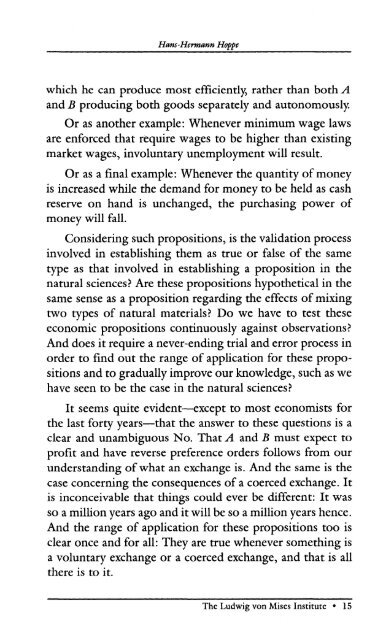Economic Science and the Austrian Method_3
Economic Science and the Austrian Method_3
Economic Science and the Austrian Method_3
- No tags were found...
Create successful ePaper yourself
Turn your PDF publications into a flip-book with our unique Google optimized e-Paper software.
Hans-Hermann Hoppewhich he can produce most efficientl~ ra<strong>the</strong>r than both A<strong>and</strong> B producing both goods separately <strong>and</strong> autonomousl~Or as ano<strong>the</strong>r example: Whenever minimum wage lawsare enforced that require wages to be higher than existingmarket wages, involuntary unemployment will result.Or as a final example: Whenever <strong>the</strong> quantity ofmoneyis increased while <strong>the</strong> dem<strong>and</strong> for money to be held as cashreserve on h<strong>and</strong> is unchanged, <strong>the</strong> purchasing power ofmoney will fall.Considering such propositions, is <strong>the</strong> validation processinvolved in establishing <strong>the</strong>m as true or false of <strong>the</strong> sametype as that involved in establishing a proposition in <strong>the</strong>natural sciences? Are <strong>the</strong>se propositions hypo<strong>the</strong>tical in <strong>the</strong>same sense as a proposition regarding <strong>the</strong> effects of mixingtwo types of natural materials? Do we have to test <strong>the</strong>seeconomic propositions continuously against observations·?And does it require a never-ending trial <strong>and</strong> error process inorder to find out <strong>the</strong> range of application for <strong>the</strong>se propositions<strong>and</strong> to gradually improve our knowledge, such as wehave seen to be <strong>the</strong> case in <strong>the</strong> natural sciences?It seems quite evident-except to most economists for<strong>the</strong> last forty years-that <strong>the</strong> answer to <strong>the</strong>se questions is aclear <strong>and</strong> unambiguous No. That A <strong>and</strong> B must expect toprofit <strong>and</strong> have reverse preference orders follows from ourunderst<strong>and</strong>ing ofwhat an exchange is. And <strong>the</strong> same is <strong>the</strong>case concerning <strong>the</strong> consequences ofa coerced exchange. Itis inconceivable that things could ever be different: It wasso a million years ago <strong>and</strong> it will be so a million years hence.And <strong>the</strong> range of application for <strong>the</strong>se propositions too isclear once <strong>and</strong> for all: They are true whenever something isa voluntary exchange or a coerced exchange, <strong>and</strong> that is all<strong>the</strong>re is to it.The Ludwig von Mises Institute • 15


